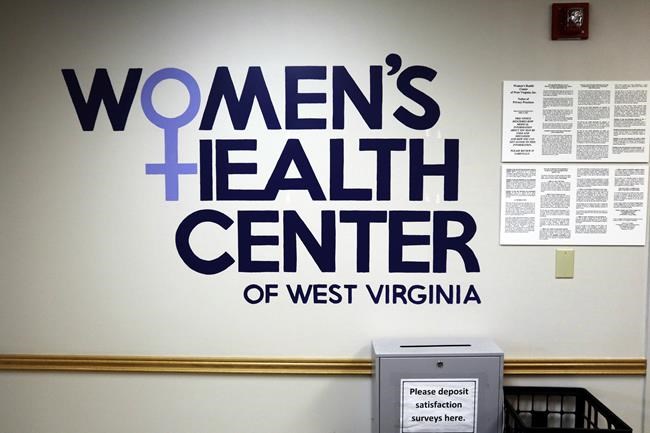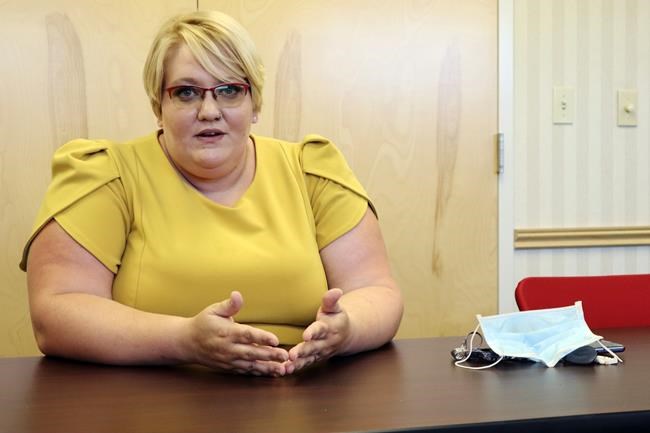After judge’s order, W.Va.’s abortion clinic resuming care
Advertisement
Read this article for free:
or
Already have an account? Log in here »
To continue reading, please subscribe:
Monthly Digital Subscription
$0 for the first 4 weeks*
- Enjoy unlimited reading on winnipegfreepress.com
- Read the E-Edition, our digital replica newspaper
- Access News Break, our award-winning app
- Play interactive puzzles
*No charge for 4 weeks then price increases to the regular rate of $19.00 plus GST every four weeks. Offer available to new and qualified returning subscribers only. Cancel any time.
Monthly Digital Subscription
$4.75/week*
- Enjoy unlimited reading on winnipegfreepress.com
- Read the E-Edition, our digital replica newspaper
- Access News Break, our award-winning app
- Play interactive puzzles
*Billed as $19 plus GST every four weeks. Cancel any time.
To continue reading, please subscribe:
Add Free Press access to your Brandon Sun subscription for only an additional
$1 for the first 4 weeks*
*Your next subscription payment will increase by $1.00 and you will be charged $16.99 plus GST for four weeks. After four weeks, your payment will increase to $23.99 plus GST every four weeks.
Read unlimited articles for free today:
or
Already have an account? Log in here »
Hey there, time traveller!
This article was published 19/07/2022 (1243 days ago), so information in it may no longer be current.
CHARLESTON, W.Va. (AP) — West Virginia’s only abortion clinic pressed forward Tuesday with scheduling abortions, even as the state’s attorney general went to the Supreme Court to try to stop it.
A Charleston judge on Monday blocked enforcement of the state’s 150-year-old abortion ban, freeing the Women’s Health Center of West Virginia to begin scheduling abortion patients. Executive Director Katie Quiñonez said Tuesday her staff planned to begin performing abortions as early as next week.
“We’re determined to continue doing so for as long as we’re able,” she said in a statement. She called Monday’s decision “a sigh of relief.”

The same day, Attorney General Patrick Morrisey said his office had filed a motion to the state Supreme Court asking it to block the decision from going into effect while his office proceeds with an appeal. He said it was “critical” for his office to file an immediate stay Tuesday “to prevent immediate loss of precious life.”
“When life is in jeopardy, no effort can be spared to protect it, including seeking whatever stay can be had,” he said. “The unborn children of our state can’t wait.”
West Virginia has a state law on the books dating back to the 1800s making performing or obtaining an abortion a felony, punishable by up to a decade in prison. It provides an exception for cases in which a pregnant person’s life is at risk.
During Monday’s court hearing, lawyers for the Women’s Health Center argued that the old law is void because it has not been enforced in more than 50 years and has been superseded by a slew of modern laws regulating abortion that acknowledge West Virginian’s right to the procedure. One example is West Virginia’s 2015 law, which allows abortions until 20 weeks.
Kanawha County Circuit Court Judge Tera L. Salango agreed, granting a preliminary injunction against the ban. The judge said the recent laws enacted by the state legislature “hopelessly conflict with the criminal abortion ban” and that it would be “inequitable” to allow conflicting laws to remain on the books.
The Women’s Health Center of West Virginia had suspended abortion services June 24, the day the U.S. Supreme Court overturned Roe v. Wade. Staffers canceled dozens of abortion appointments, fearing they or their patients could be prosecuted under the old statute.
Quiñonez told The Associated Press in an interview Tuesday that she was traveling for a fellowship on reproductive health rights and justice when the judge’s ruling came down, so she was not at the clinic to see the reaction from her staff.
“I have no doubt that when they found out that there were tears of joy, and lots of excitement about being able to tell a person who’s calling asking how they can get an abortion, ‘Oh, we can provide you with that care here, like we’re supposed to,’” she said.
The clinic has been posting on social media and sending out information in its email newsletter to let people know they can once again schedule abortions. They have also reached out to clinics in surrounding states where West Virginians have been traveling for abortions after the Supreme Court ruling, letting them know West Virginians now have abortion access in their home state.

But she said operations won’t just go back to the way they were before the clinic had stopped performing abortions. She said the staff has been upfront with patients booking appointments that they are open for abortions again pending further court action, like the state’s appeal. The West Virginia Legislature could also decide to take up abortion during a special session in coming weeks to clarify the old law or pass new bans or restrictions.
“We’re telling them, ‘It’s a moving target, things could change,” she said. “It’s all about transparency and autonomy and shared decision-making … In our conversations with patients, they need to know all of the options and the reality of everything upfront. We’re not trying to lie to our patients.”
They have also had to scale back the gestational age at which they are able to provide abortions from just under 18 weeks to 16 weeks.
Amid the increasingly hostile political climate around abortion care, Quiñonez said recruiting doctors willing to provide abortions has long been a challenge. She said many of the physicians who perform abortions at the West Virginia clinic travel from out-of-state.
In the weeks since Roe was overturned, she said the out-of-state physician who was trained to perform abortions at 17 weeks and six days has picked up a full-time schedule at the clinic in the state where they live.
“We’ve essentially lost them,” she said. “And I mean, that’s part of the strategy of these abortion restrictions or abortion bans — even if you temporarily stop abortions from happening, or are able to halt a clinic’s operations, it has profound effects for resuming abortion care moving forward.”

